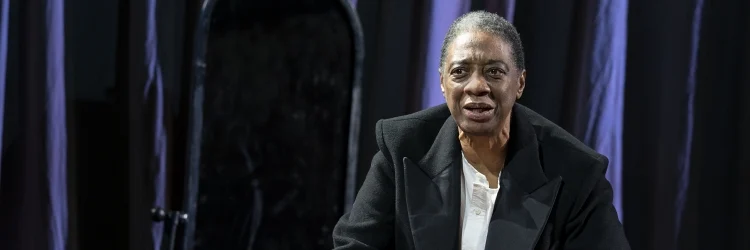Review of Frankenstein at Classic Stage Company
Though created 80 years apart, Mary Shelley's Frankenstein and Bram Stoker's Dracula are pop-cultural close cousins. Their gothic bond was forged in 1931, when each received its own horror flick treatment, with Boris Karloff cast as the monster born from the dead and Bela Lugosi as the vampire that would not die. Since then, the works have been satirized, sexualized, analyzed and animated. And now, the Classic Stage Company resurrects them for the Off-Broadway stage, in a repertory cycle of two experimental, yet starkly different productions at the Lynn F. Angelson Theater.
Frankenstein, as adapted (in 2017) by Tristan Bernays and placidly directed by Timothy Douglas, takes a decidedly minimalist approach, with just two actors, limited costuming and no discernible makeup. Rob Morrison is the one-man chorus. He narrates, strums a few different string instruments that, if not exactly furthering the action, sets a mood, and voices a variety of doomed to be strangled characters. Stephanie Berry portrays The Creature and if it is at first surprising that an African American woman is inhabiting the role, one realizes soon enough that when it comes to portraying the undead, any casting is against type.
Rather than forging any sort of contemporary sociological statement, the creative team has opted to let Shelley's work speak for itself. That is, once it learns to speak. The first quarter of the 80 minute one-act is primarily concerned with the creature coming to life, learning the joys and dangers of the natural world and very slowly gaining language skills. Thus, Berry does a lot of grunting and gesticulating. One clever moment successfully transforms the monster's moans into an understanding of music, but it is otherwise a long slog.
Once the creature has grasped English, words spill forth in full Victorian splendor. Bernays has picked the meatiest swaths of Shelley's novel and serves them up in heightened language, primarily in narrative passages spoken directly to the audience. "I left the woods in the deep decay of autumn and trudged into the bare bones of winter, the earth beneath me hard as my heart." The storytelling is pleasing to the ear yet, as staged, the misery of both the monster and the monster builder is undercut by a lack of theatricality and seemingly intentional deadpan manner. Not helping matters, the essence of Dr. Victor Frankenstein is scattered. While it makes good dramatic sense to have Berry inhabit both creature and creator, the doctor is initially portrayed by Morrison. When Berry suddenly takes over the representation, it is more confusing than enlightening.
John Doyle, the fine musical director who is bringing Assassins to CSC in April, pitches in as scenic designer. His sparse offerings include a large table that works well as the slab upon which the brute takes its first breaths, but then mostly just gets in the way. Meanwhile, a full-length mirror goes under utilized. The creature at one point peers at its own hideous visage, but in a tale that explores the duality of mankind, more reflection, of every type, would have been welcomed.
(Photo by Joan Marcus)
WHAT THE OTHER CRITICS SAID
"Bernays's reimagining doesn't lack for theatricality. And by foregrounding the creature's experience and delaying the violence, Bernays solicits our empathy for him — a provocative choice, as Shelley skews a lot more equivocal. In denaturing the stage action from the narrative, though, the play makes it possible to admire Berry's certified-organic artistry and Morrison's haunting accompaniment, without feeling anything like unease. Is it alive? It is not."
Alexis Soloski for New York Times
"Tristan Bernays' two-actor retelling of Frankenstein is more experimental and challenging. Stephanie Berry has a dual male role as both the Creature and the Doctor who created it; Rob Morrison handles all the other characters and supplies live music and sound effects. Clad in a sexless suit with no makeup, Berry is excellent and empathetic as the Creature, who just wants to be loved; at the outset of the play, it's fascinating to watch the monster slowly gain consciousness, speech and reason before our eyes."
Raven Snook for Time Out New York
"As with the novel, the Creature here goes from grunting idiot to Rhodes Scholar in record time. Stephanie Berry gives a grand, pompous performance as the Creature. She also gives a grand, pompous performance as its maker, Victor Frankenstein. By the way, is it now politically incorrect to call it "the Monster"?"
Robert Hofler for The Wrap
Originally published on
